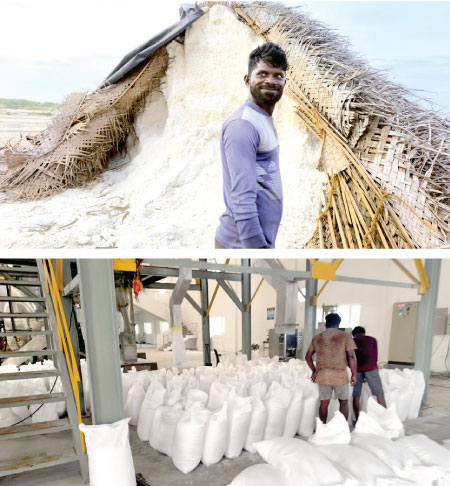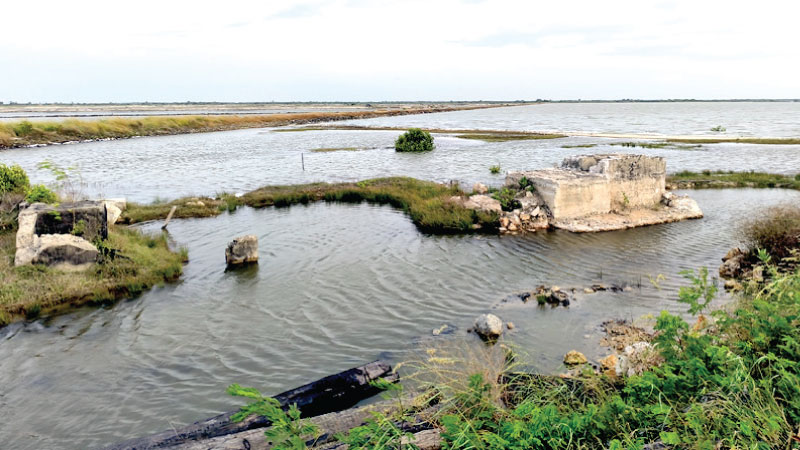The prevailing salt crisis in Sri Lanka has given rise to a need for expedited salt production within the country, with the Government currently importing salt to meet the country’s demands.
Fuelled by nationalist sentiments, divisive rhetoric over branding, climate crisis and an ongoing strike, misinformation surrounding salt production in the Elephant Pass saltern has heated up parliamentarians and citizens alike. This week, the Sunday Observer went to Elephant Pass Saltern to understand the complexities that have given rise to this crisis.
The Elephant Pass saltern, the largest saltern in the Northern Province started its operations in 1938 under the The Salt Department, went through several different administrative controls, exchanging hands between the State of Sri Lanka and the LTTE from time to time till the end of the civil war. It is widely believed that the Elephant Pass Saltern served as the primary salt supplier to the LTTE controlled areas in the North and the East of the country at the time. Following the end of the civil war in 2009, the Elephant Pass saltern was developed in two phases and was handed over to the National Salt Ltd. in 2015 via Gazette, becoming a vital pillar in the country’s salt industry. An industry that depends on sunlight, wind, the predictability of the changing weather pattern and is still very much using traditional methods, the salt is harvested during the dry seasons of the year and stored, while the harvested salt is packed and processed during the rainy seasons.
 Over the years multiple administrations have invested in the development of the Elephant Pass saltern with the latest major milestone being the opening of the “Raja Salt” factory at the Elephant Pass saltern premises in March this year. The new factory is the largest of its kind in the country and has the capacity to produce five tonnes of salt per hour with 1 kg and 400g table salt packets. But it came to an abrupt stop following protests and by workers and locals who demanded that the name should be changed to “Anairavu Salt”. Currently it is producing 50 kg bags which are bought by companies and repacked under different brand names in various parts of the country. But this seems to be one of the many layers of issues that persist at the Elephant Pass saltern that has contributed to the current salt crisis.
Over the years multiple administrations have invested in the development of the Elephant Pass saltern with the latest major milestone being the opening of the “Raja Salt” factory at the Elephant Pass saltern premises in March this year. The new factory is the largest of its kind in the country and has the capacity to produce five tonnes of salt per hour with 1 kg and 400g table salt packets. But it came to an abrupt stop following protests and by workers and locals who demanded that the name should be changed to “Anairavu Salt”. Currently it is producing 50 kg bags which are bought by companies and repacked under different brand names in various parts of the country. But this seems to be one of the many layers of issues that persist at the Elephant Pass saltern that has contributed to the current salt crisis.
Branding the right kind of nationalism
Perimbarasa (35), a seasonal employee at the Elephant Pass saltern since 2022 told the Sunday Observer that the lack of work available and inefficiencies of the present administrative staff at the saltern are more pressing issues than the disagreement over the brand name. “Why we are saying to use the name “Anairavu Salt” is because it is more popular than “Raja Salt”. This is a name that has been popular amongst the diaspora as well for years. It is just similar to the same reason as to why we still use “Ceylon Tea” to refer to Sri Lankan tea,” said Perimbarasa. He also refuted claims made by Industries Minister Sunil Handunetti in Parliament earlier this month over an alleged objection to transporting salt produced in the Elephant Pass salterns to the South of the country. “We have never had any problem with salt being sent to the South. For decades the majority of the salt harvested have been sent to the South,” added Perimbarasa. He said that his mother who also worked at the Elephant Pass saltern in the 1970s, prior to the civil war, still recalls how trainloads of salt harvested in the Elephant Pass saltern was transported to the South with great pride. “We know the potential of this (Elephant Pass) saltern. Now we send the harvested salt in trucks,” said Perimbarasa.
Many of the employees on strike at the saltern said that the primary objective of the strikes are not about the name or supplying of the salt outside of the Northern province but rather a struggle of the seasonal employees trying to make a living in a safe and suitable work environment. Kugenthiran (51) who has been working at the Elephant Pass saltern since 2019 said that the 120+ workers who are currently on strike have not been compensated a fair wage, the incompetency of the current manager of the saltern and are demanding better working conditions.
“There are over 200 workers working at this factory and up until six months ago we used to have to work for about 20-22 days every month. But now we are only given work every eight to 10 days. We are paid for the work we do each day and this is not enough to live,” said Perimbarasa. According to Kugenthiran and other employees on strike, the current Manager at the saltern does not have the expertise nor the knowledge to operate the saltern and get its full potential. “The Sinhalese Manager before him gave us work. If salt harvesting was interrupted he would make us clear up ditches and prepare the ponds (saltern pans). But he was transferred to the Mannar Saltern. His Assistant Manager, M. Suyanthan is the current Manager. The slightest bit of rain stops work. He spent most of his time as an Assistant Manager behind a computer. He doesn’t know how to continue harvesting salt even if it rains,” said Kugenthiran. “We want the previous Manager back. It is good for us, the saltern and everyone,” said Kugenthiran.
Kugenthiran said that while rainwater can have an impact on the salt production, rainwater does not significantly mix with the salt water that is in the process of being harvested. He said that there are new and traditional methods by which an experienced salter can separate the rain water from the salt water. “He just lacks experience and knowledge. We have barely produced any salt compared to the previous years,” said Kugenthiran.
Despite the claims made by the employees on strike, the present Manager at the saltern M. Suyanthan told the Sunday Observer that there has been a reduction as claimed by the employees in the salt production. “As a matter of fact there is growth. Over the years, except for 2021 and 2022 because of the Covid-19 pandemic and the economic crisis, the harvest has almost doubled. But this year the rains have been unprecedented and have had a major impact on the production. This is not something I’m doing. This is the result of the changing climate and weather patterns,” said Suyanthan. While he did not specify for what reason certain employees are in disagreement with him, he acknowledged that it has had an impact on the operations of the saltern before he retired for the day.
Issue about working hours
One saltern officer, who wishes to remain anonymous, told the Sunday Observer that rather than a production or an issue about working hours, the conflict between the Manager and the seasonal employees on strike is a result of caste discrimination. “The Manager is from Jaffna. These employees are from the Kilinochchi. This Manager speaks to them as if they were stray dogs. I can understand why they would want the previous Sinhalese Manager. He would sit with them. Let the employees also sit when in a room. It is not the same with him. Casteism here is a lot more different than casteism in the South,” he said.
While Suyanthan’s sentiments regarding the impact of rain are shared by the Chairman of the National Salt Ltd. Gayan Wellala, both do not seem to have a comprehensive solution. With the climate crisis only worsening the threat it poses to Sri Lanka’s salterns and the traditional form of harvesting is higher than ever before. The packaging Plant Manager at the Elephant Pass saltern Lalith Kumara told the Sunday Observer that adaptation is not impossible. “Rainwater can be separated, but only in deep tanks. So if we are to continue harvesting in these changing weather patterns we must focus on constructing more deep tanks in comparison to the shallow tanks. Yes, it means we have to reassess our salt production all together,” said Kumara.









